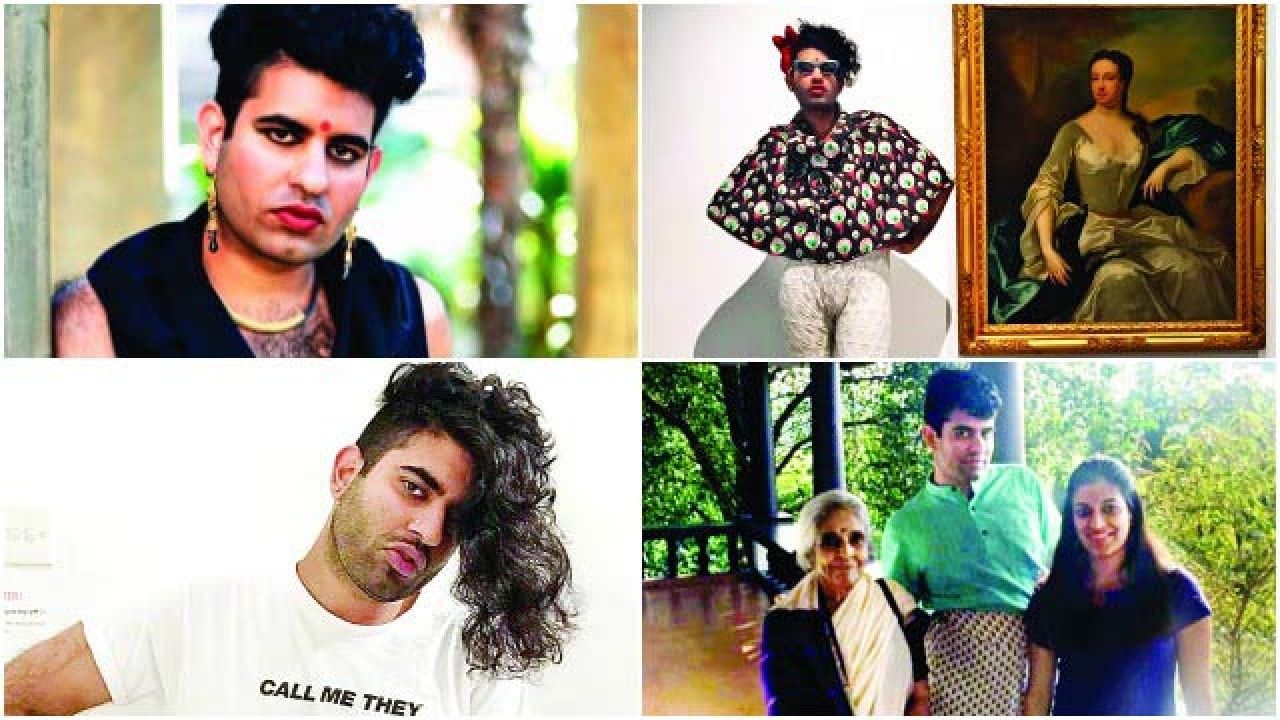
You describe yourself as a non-binary trans-feminine writer, entertainer, and performance artist. Where does art and sexuality intersect for you?
I started writing diaries, because I face harassment so often. Art, or performance poetry, is one of the only spaces where I can go looking for answers. Where I feel safe and recognised. Growing up, I didn't have role models who were queer, so that's something I wanted to commit to.
Cisgender artists don't have to place their art in context of their gender/sexuality — is the assertion a natural expression, or a political statement?
Both. Because transgender people's voices and perspectives are erased so often, something as simple as writing about my identity becomes political. I realised at some point that I will never have that space where my poetry is not linked to my sexuality or gender, so I said, okay, let's write about it.
All of us deserve a space that is much more complex. It is my dream to have that space currently given to white, cisgender, straight men. The aim of feminism and trans politics is to achieve a world where these are not needed. I wish for a world where I could have people only say, Alok is an artist. But I have to announce my other identities, because we are not there yet.
Tell us about your journey...
I started writing poetry in 2006, engaged with performance poetry in college and then started performing in 2011. The writing came from a sense of purpose, not a hobby— I devoted myself to creating my poetry, my narrative, my passion, my 'self'. My desire to find people like me led me to share the work in public. It was like asking: Hey, is anyone out there? Surprisingly there were; and not just ones who shared my identity. I would get messages from Indian aunties who'd say my work helped them understand what their children were going through.
What is poetry to you?
It's about asking, 'Who am I'? Creatively, politically? It is about giving birth to myself in a culture where all my narratives are written by others. It is about rejecting all sorts of binaries. Poetry is as much about meeting people and having life-changing conversations. In that sense, art gives you the space activism can't. Activism would say, there's cis and trans. Art would say, it's much more complex – there are entire histories of identities waiting to be unpacked.
You prefer they/them as your personal pronoun. What are the vocabulary basics that any non-binary ally should know?
'Transgender', 'cisgender', 'non-binary', 'queer' and 'gender non-conforming'. The last one is very important because gender-nonconforming are people who do not visually conform to the idea of their gender, thus facing homo/trans-phobia and violence the most.
You've written about your Achamma (grandmother) who does not understand trans vocabulary but is happy to share your quest for that freedom. Where do you think we lost our receptiveness to the multiplicity of nature?
In a world that's hyper-digitalised, I feel we are losing the reality that no algorithm can capture the human soul. To my grandmother, family is everything. There's a certain non-conditionality, refusal of disposability and inter-dependability unlike in our generation. A good ally is not about the correct language, but this commitment to needing each other. This idea that my family may not understand my art, but if I show up to the table in a dress, I'd still have food on my plate.
You were harassed for dressing your way. Was this in New York?
The place is everywhere. I've never experienced a place where I can dress the way I want without facing hate or violence. For me, that place is in the privacy of my loved ones.
You speak of LGBTQ rights and women's rights as if they are the same thing...
People with power want women and trans people to fight each other, instead of fighting them. To me women's rights is a continuum of the fight for my own rights. Sadly, for most cis women, the opposite isn't true.
Why is the Women's March the 'Women's March' and not the March against misogyny? When we link our fight and our politics to our bodies, we erase people like me, who may not have breasts and a vagina, but have faced the worst of patriarchal violence. We are all being punished for not conforming to the patriarchal definition of our assigned genders. Cisgender women have been the foundation of my feminism. It makes me sad to find that the support is not reciprocated.
You love fashion – saree and high heels... In the world you are fighting for, what else would you flaunt?
I think about this all the time, but I don't really know. Even while I'm posing for Snapchat in my favourite outfit, I know it is ephemeral. I know people who tell me how beautiful I look online won't know that I had to pack an entire other bag of clothes with me, or be accompanied by four other people so I don't face violence. Even then, I'm wondering: Am I really beautiful? Or am I only beautiful because that's what they are telling me? I see the possibility of the world where I know what it's like to feel safe. But I am stuck with the reality.
Follow Alok Vaid-Menon's work at returnthegayze.com and on Darkmatter on Facebook